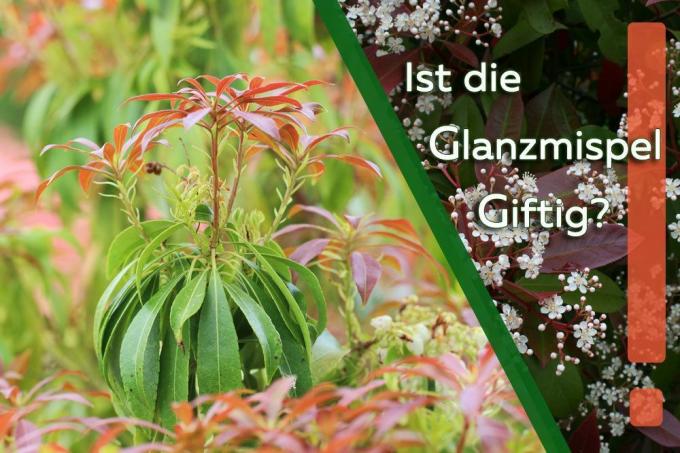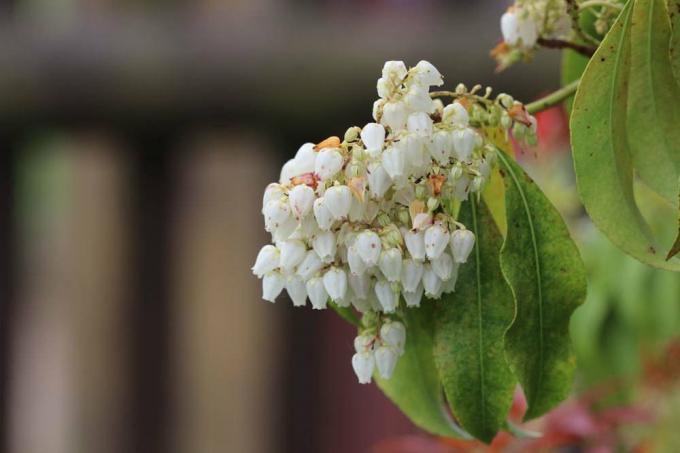
table of contents
- recognition
- Toxicity
- Symptoms of poisoning
- Healthy adults
- children
- Allergy sufferers
- animals
- First aid
- Water and charcoal tablets
The red robin loquat is an ideal choice for evergreen and attractive hedges. The beautiful decorative wood impresses with bright red leaves and the fruits of the same color set great accents in every garden. But whoever decides on the Photinia "Red Robin" should know beforehand whether it is poisonous and to what extent it could be dangerous for humans and animals. Plantopedia explains.
recognition
If you already have a loquat in the garden and don't even know it, or if your children are playing in the neighboring planted garden, you should find them. The following identifying signs and typical characteristics of Photinia will help you with this.
Optical features
- Grows bushy upright
- Can reach a height of up to 3.5 meters
- After budding, its leaves change from dark green to red
- Flower color: white
- Red berries form after flowering
Generative characteristics
- Grows primarily on sunny to shady, sandy and loamy soil
- Flowering period: between May and June
- After the flowering period, the seeds develop into early winter
Toxicity
Is the red robin Photinia 'Red Robin' poisonous?
The answer to this question is clearly yes. However, the poisonous parts of the plant are only the berries that grow after flowering. In addition, the toxicity relates only to humans and various animals. Birds, for example, like to eat the fruit and do not suffer from any symptoms of poisoning. Accordingly, they are not toxic to them.
How dangerous is the poison?
This Photinia fraseri variety is classified as slightly poisonous by the Bonn Poisoning Center. Their venom is only negligible. As far as we know, mere skin contact with them does not lead to a skin reaction, unless you are allergic. As a non-allergic person, the poison from the pulp is only toxic when consumed and can lead to poisoning.
Nevertheless, the small amount of poison present can be enough to cause strong body reactions under certain circumstances. It always depends on the person and the animal. Age and health as well as physical condition play the most important role. Of course, the amount of black blackberries consumed is not insignificantly responsible for the severity of poisoning. But they never pose a threat to life.
Symptoms of poisoning
Healthy adults
In healthy adults, only slight symptoms of poisoning are to be expected, provided that the body has not received large quantities of the common loquat, which is classified as poisonous.
The main classic signs of poisoning from this strain include:
- General malaise
- Abdominal and / or stomach pain
- Vomiting if consumed in large quantities
- diarrhea

children
Babies and toddlers up to eight years of age in particular should be kept at a distance from the loquat with red berries. Because of her not yet fully developed immune system can cause the symptoms already mentioned
healthy adults with a significantly higher intensity. In addition, other body reactions can become noticeable, especially if the fruit is consumed more extensively. Possible consequences can be:
- Stomach cramps
- Light fever
- skin rash
Allergy sufferers
Although the poison can usually only show effects inside the body when consumed, so can In allergy sufferers, the symptoms are noticeable with mere skin contact with the pulp do. Skin irritation, a slight burning sensation that sets in after a few minutes and itching are typical allergic reactions of the skin.
You do not have to be known as an allergy sufferer, but a special hypersensitivity to the toxin is sufficient. Consumption / contact with allergy sufferers does not normally lead to a life-threatening situation.
If you consume the fruit, the following symptoms may occur in addition to those already mentioned:
- Swelling of the mouth and throat
- Severe stomach and stomach pain
- Stomach cramps
- Rash after consumption or skin contact
- Difficult breathing
animals
As already mentioned, consumption of these loquat fruits has no consequences for birds. They seem immune to the poison. The situation is different with pets such as dogs, cats and guinea pigs. In principle, the following applies here: the younger and smaller the animal, the higher the risk of poisoning, which can be assessed as easy. By the way, cats tolerate the berries better than dogs and rodents.
Possible signs that could indicate poisoning are:
- diarrhea
- Low whistling because of abdominal and / or stomach pain
- Lively beings stand out due to an unusual need for rest and cannot be encouraged to play
- Refuse to eat
- Drink a lot or nothing at all
- Vomiting is rare in adults - more often in young animals
First aid
What to do after eating berries
Water and charcoal tablets
Basically, there is not much more you can do than drink plenty of water. This should be free from additives. It ensures that the poison from the stomach gets into the intestines. There it is thickened with the remaining contents and excreted in the stool. Any abdominal pain will then subside a short time later. The administration of Charcoal tablets. These favor the thickening of the intestinal contents with the poison in order to prevent the poison from entering the bloodstream.
When to consult a doctor?
In the event of vomiting and strong body reactions to the poison of the red robin "Red Robin" as well as in Babies and Toddlers, a doctor should be consulted or informed about the matter by telephone. This will initiate appropriate measures or instruct you to take certain measures. He can prescribe medical treatment for long-lasting and / or severe symptoms. The symptoms of poisoning automatically decrease the more the body breaks down the poison. In addition to the doctor, the nearest poison control center also offers help. You can find a list of poison control centers in Germany here.
Poisoned pets
As a rule, animals can be expected to recover independently in the event of slight poisoning. Depending on the amount of poison consumed from the Photinia and age, this can take half a day to two days until your animal feels better again and plays, eats and drinks as usual. If worrying conditions arise, you should contact the veterinarian as a precaution. As with humans, medication can be given to relieve the symptoms. The veterinarian needs to know that the fruits of this loquat variety have been swallowed.

Note: Please note that this article does not in any way replace a visit to the doctor. There is no guarantee that medical statements are correct.
You will find detailed information on first aid in the event of poisoning and important information on poison control centers here.


